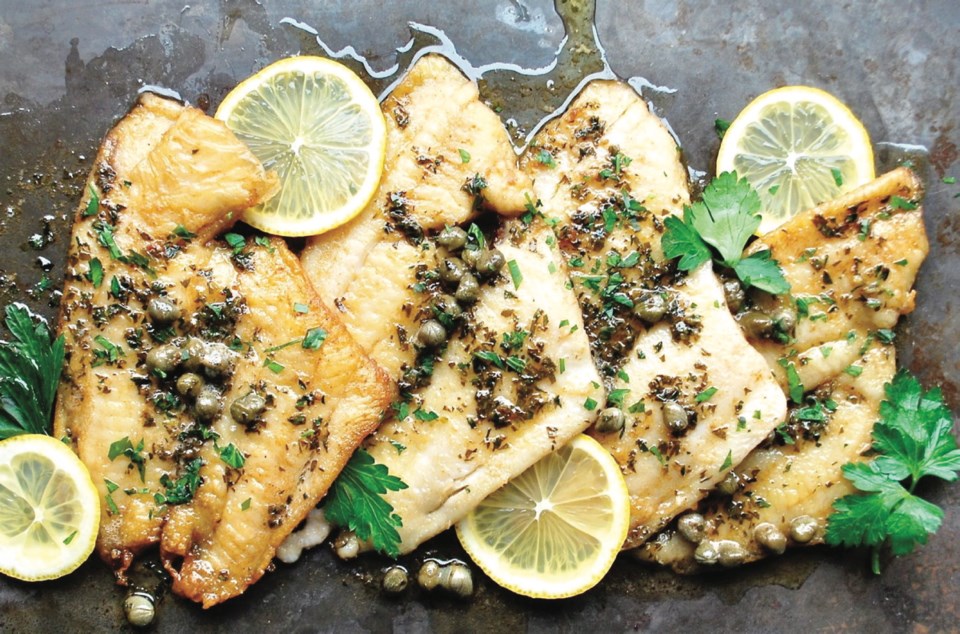Adventurous cooks are always keen to learn new ways to prepare fish. But wise ones know it’s sometimes best to fall back on a classic, proven technique if you want to guarantee your catch of the day will taste great.
When it comes to cooking sole, à la meunière is one of those classic techniques. Beyond the fish always being flavourful, the appeal of this method is that it’s simple, despite the fancy-sounding name.
À la meunière is a French cooking term that translates to “in the manner of the miller’s wife.” A miller is a person who own or works in a grain mill, so it’s not surprising that à la meunière is a reference to the flour you lightly coat the fish with.
Once coated, the fish is sautéed, plated and topped with a butter sauce flavoured with lemon and parsley. Some recipes, such as Julia Child’s, also give you the option to add capers to the sauce.
This method works well for fish such as sole because the flour, when cooked, turns a lovely golden colour and forms a bit of crust, helping it to hold the delicate fish together. And, because sole is mild-tasting, the simple sauce you spoon over it won’t overwhelm its flavour, but its butter content will certainly make it rich-tasting.
In France, a whole, skinned sole, such as North Atlantic-caught Dover sole, is often what’s cooked à la meunière. On the west coast of Canada, though, you likely won’t find that type of imported sole for sale. But you will see fresh B.C.-caught sole fillets available at seafood stores and many supermarkets.
Those fillets can also successfully be prepared à la meunière, but when you eat them, you won’t actually be eating sole.
Why?
It’s because in Canada and the United States, fish fillets sold by names such as Pacific Dover sole, petrale sole or, simply, sole, are actually members of the flounder family. These flatfish look, taste and have a similar texture to sole. In a retail setting, sole is a more recognizable name, which appears to be why someone decided give them that handle.
There are variations on how to prepare fish à la meunière. Some recipes, for example, ask you to use clarified butter, while others do not. My method does not, because I like the nutty taste the butter develops when the milk solids in it cook. I do add some oil when sautéing the fish, as that helps prevent those solids from burning.
Because sole à la meunière cooks quickly, it’s best to have everything ready to go — such as having the fish patted dry and ready to cook, the butter out and measured, the lemon juice squeezed, and the parsley chopped.
I like to serve the fish with boiled miniature potatoes and a green vegetable, such as asparagus or green beans.
B.C. Sole à la Meunière
Delicate B.C.-caught fish, coated in flour, sautéed until golden, then deliciously topped with a simple butter sauce flavoured with lemon and parsley.
Preparation time: 15 minutes
Cooking time: About six minutes
Makes: Two servings
2 large (about 150 grams each) or 4 small (about 75 grams each), B.C. sole fillets, such as Petrale sole or Pacific Dover sole (see Note)
• salt and freshly ground black pepper, to taste
1/3 cup all purpose flour
1 1/2 Tbsp olive oil
5 Tbsp butter (divided)
2 Tbsp chopped fresh parsley
1 Tbsp freshly squeezed lemon juice
2 to 3 tsp capers (optional)
• lemon slices and parsley sprigs, for garnish
Preheat oven 200 F. Pat the fish dry with paper towel. Season each fillet with salt and pepper. Place the flour in a shallow sided dish, such as pieplate. Coat each fillet in flour, shaking off the excess, and then set on a wide plate.
Place the oil in a large skillet (mine was 12-inches wide; see Eric’s options) and set over medium-high heat. When oil is hot and shimmers, add 2 Tbsp (1/8 cup) of the butter to the pan. Quickly swirl the butter until its melted and foam from it subsides. Now quickly add the fish to the skillet and cook until golden on the bottom, about two to three minutes. Carefully turn each fillet over and cook one to two minutes on the other side, until just cooked through.
Carefully remove the fillets from the pan and set on a serving platter or directly on two dinner plates. Keep fish warm by setting the platter or plates in the oven.
Discard the oil/butter you cooked the fish in and wipe the skillet clean with paper towel. Set the pan over medium heat. Add the remaining butter and cook until it’s melted and rich golden. Remove pan from heat, and then stir in lemon juice, chopped parsley and capers, if using. Spoon this sauce over the fish, garnish with lemon slices and parsley sprigs, and serve.
Note: Sole fillets are sold at most supermarkets and seafood stores. For today’s recipe, I bought petrale sole fillets at Oak Bay Seafood (oakbayseafood.com).
Eric’s options: If you don’t have a very large skillet, you could use a smaller one and cook the fish in batches, keeping the cooked ones warm in the oven as you along.
Instead of sole, cook other fish fillets using this method, such as pacific snapper.
Eric Akis is the author of eight cookbooks. His columns appear in the Life section Wednesday and Sunday.



